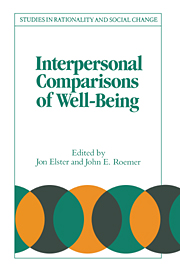Book contents
- Frontmatter
- Contents
- List of contributors
- Acknowledgments
- Introduction
- 1 The moral basis of interpersonal comparisons
- 2 Against the taste model
- 3 Utilitarian metaphysics?
- 4 Local justice and interpersonal comparisons
- 5 Notes on the psychology of utility
- 6 Adult-equivalence scales, interpersonal comparisons of well-being, and applied welfare economics
- 7 Interpersonal comparisons of utility: Why and how they are and should be made
- 8 A reconsideration of the Harsanyi–Sen debate on utilitarianism
- 9 Deducing interpersonal comparisons from local expertise Ignacio
- 10 Subjective interpersonal comparison
- 11 Utilitarian fundamentalism and limited information
- Index
7 - Interpersonal comparisons of utility: Why and how they are and should be made
Published online by Cambridge University Press: 05 June 2012
- Frontmatter
- Contents
- List of contributors
- Acknowledgments
- Introduction
- 1 The moral basis of interpersonal comparisons
- 2 Against the taste model
- 3 Utilitarian metaphysics?
- 4 Local justice and interpersonal comparisons
- 5 Notes on the psychology of utility
- 6 Adult-equivalence scales, interpersonal comparisons of well-being, and applied welfare economics
- 7 Interpersonal comparisons of utility: Why and how they are and should be made
- 8 A reconsideration of the Harsanyi–Sen debate on utilitarianism
- 9 Deducing interpersonal comparisons from local expertise Ignacio
- 10 Subjective interpersonal comparison
- 11 Utilitarian fundamentalism and limited information
- Index
Summary
… I still believe that it is helpful to speak as if inter-personal comparisons of utility rest upon scientific foundations – that is, upon observation or introspection. … I still think, when I make interpersonal comparisons … that my judgments are more like judgments of value than judgments of verifiable fact. Nevertheless, to those of my friends who think differently, I would urge that, in practice, our difference is not very important. They think that propositions based upon the assumption of equality are essentially part of economic science. I think that the assumption of equality comes from outside, and that its justification is more ethical than scientific. But we all agree that it is fitting that such assumptions should be made and their implications explored with the aid of the economist's technique.
Robbins (1938, pp. 640–641)Introduction
Background
Personal ethics should be about living a good life (cf. Williams, 1985), ethics in public policy about making good public decisions, and ethics in economics about choosing economic policies that improve the allocation of resources. This brings ethics very close to normative decision theory. Indeed, ethics may even become, at one and the same time, both an application and an ideal form of that theory.
Many approaches to ethical decision making have received the attention of moral philosophers and practical people. In my view, none is as satisfactory as an idealized form of utilitarianism based upon an ethical concept of utility.
- Type
- Chapter
- Information
- Interpersonal Comparisons of Well-Being , pp. 200 - 254Publisher: Cambridge University PressPrint publication year: 1991
- 50
- Cited by



